5-out creating gaps
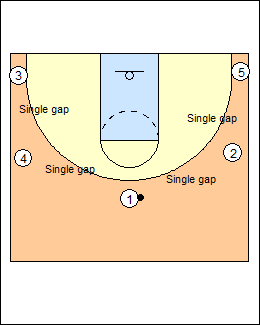 | 1 See Offence - 5-out youth motion, MacKay single-double gaps, Tactics - Creating Gaps, also Blog Posts - 5-Out Dribble Penetration, 5-Out Motion, Conceptual Offence. 1) Delayed fill cuts 2) Exit cut reads 2) Progressions A goal on offence should be to create, maintain and exploit gaps for dribble penetration and cuts for passes. Gaps are created by spacing and cutting. Conventional 5-out spacing is all single gaps, so cuts are needed to create bigger gaps, especially basket cuts (give and go) and back cuts. To maintain a gap, players away from the ball hold their spacing for a two-count and react to a drive or fill empty spots if there is no drive. Fill cuts are delayed. A basket cut or backcut is a scoring opportunity, then exit cut but first read what's going on (e.g. react to a drive or shot). Mike MacKay - Single-Double Gaps - the problem with single gaps is stationary passes and quick help and recovery. Create a double gap by cutting a player. Film Room - Gap Theory (Spacing) - Spacing creates gaps to attack. 4-out 1-in spacing (41) is most common as it maximizes space for each gap (and allows baseline gaps). 5-out spacing (50) has much smaller gaps to drive through, but is wide open once you get to the lane. 50 stretches the defence outside the paint and takes away a traditional rim protector. Spacing allows the offence to create mismatches, make 2 guard 1, and drive bad closeouts. DHOs create gaps. Film Room - Learn the Gap Theory - the foundation is great spacing, try to create mismatches, make 2 guard 1, and win closeouts (shoot while the defender is still closing out, or drive if the closeout is too aggressive). Coach Daniel - Future of Offence? - on a drive from the top with 5-out spacing, the help is late. Having 4 guys out and one guy in the dunker spot is still 5-out spacing to him. Tyler Coston - Race and Space Overview - keep the rim open as much as possible, hunt that space with the dribble, he doesn't want players cutting to the rim all the time (there is no rim runner). 5-Out Revolution - with 5 at the top of the key with the ball and the paint wide open, basket cuts are especially effective. KG Basketball - 5-Out DDM - initial 5-out spacing has small gaps (defences turn into almost a 1-2-2 zone), and he still wants a rim runner, so he uses a 4-out 1-in entry to get into 5-out. Adam Spinella - Hoiberg 5-Out Concepts - 5-out spacing allows for backcuts, the rim is vacated. From 4-out 1-in, 5 can gut cut out top for a pass (then with a 45 cut from the weakside wing). A three-guard front allows full ball reversal with two passes, and can be used with a low post and one corner player (see Fast breaks - Mike Brown early flow). Alex Sarama - Building a Conceptual Offence - 5-out spacing is quicker to get into than 4-out 1-in, you won't have to wait for a trailer to get down to the low post. In a neutral situation, they immediately run a trigger to get double-gap spacing, e.g., the trailer screens away or drag screens, they are not in 5-out for long. 2014 San Antonio Spurs - basic philosophy was ball movement (passing) and player movement (cutting). They played “point 5 basketball” – after catching the ball, make a decision to pass, shoot or drive within half a second (Steph Curry - that’s when the dominoes start to fall). Goals on offence are to create an advantage and convert it into a basket (advantage basketball). The Spurs used ballscreens to create advantages, and converted by attacking close-outs off the dribble (using pump fakes) and with relocation cuts on dribble penetration (drive, kick, exit). |
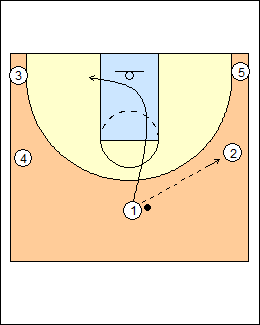 | 1) Delayed Fill Cuts a) On a pass to 2, 1 basket cuts and clears to the weakside corner, or optionally just cuts directly to the corner to create space. Any cut to the basket can pressure the defence, causing it to collapse. 4 does not immediately fill behind, as 2 needs time to look for the cutter and then possibly drive behind the cutter. 1's cut creates a double gap for 2, but also for 4. Lason Perkins - when replacing the cutter, wait until the ballhandler is done looking at the cutter. Basketball NSW - a cut that is made toward the basket creates space behind for a second cutter, or for the ballhandler to "drive on the back of the cutter". Hal Wissel - draw and kick is best used from the wing after the ball has been swung from the other side. Lisa Thomaidis - Basic Offence for Youth Basketball - every cut must be a scoring cut. |
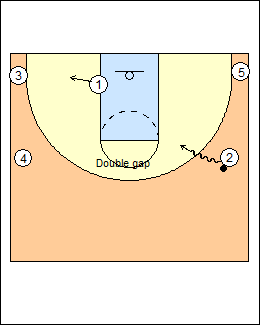 | 3 By holding (delaying a fill cut), 4 maintains a double gap for 2 to attack middle. How 4 reacts to a drive depends on the offence, e.g. backcut, push or rotate behind. Dribble penetration draws help (two defenders play the ball), leading to a kick-out pass and often an extra pass for a shot or another drive. Often a teammate will cut to the basket on penetration. Penetrate-Pass-Pass - making the extra pass after an initial drive-and-kick re-opens the lane for another drive, keeps the defence in rotation and forces long closeouts. Thomaidis - penetration causes the defence to collapse, a pass out creates a long closeout, the extra pass is the one that defences have a hard time getting out to. They are always trying to create long closeouts, that is the most difficult defensive skill. Penetrate-penetrate is a turnover in practice. Chris Oliver - Villanova Second Cuts - a teammate can basket cut on dribble penetration if their defender loses sight of them. Tyler Coston - Space to Hunt - in transition, hunt the "logo" off the dribble then cut to score with a "burn cut" from a corner or 45 (a defender loses vision, attack the back of their head). Score with 45 Cuts - a baseline drive opens up a weakside 45 cut as defenders help and drop (cover down). Sarama - Teaching Offensive Concepts (pdf) - a double/triple gap, match-up advantage, or late clock is a green-light situation in a static 1-on-1. There are also two-player actions (triggers) to create an advantage, e.g. DHOs, Gets, ballscreens, and three-player actions such as Pistol. How to Teach Youth Motion - automatic drives are a) draft drives (follow a cutter), b) real-estate drives (the spot next to you is empty), c) your defender steps over the 3-point line. |
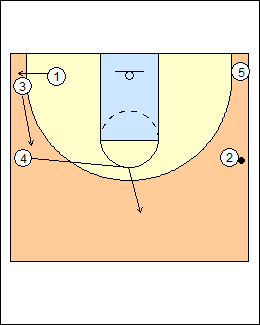 | 4 4 fills the top, using the double gap to blast cut after a two-count (or just fills the top if 2 passes to 5, see below). 3 does not need to fill behind immediately. This is an attacking action, 4 can backcut, catch and shoot, or catch and drive left or right. Otherwise 3 blast cuts to the wing. Mike MacKay - How to Teach Cutting - double-gap spacing gives 2 space to penetrate, but also 4 space to make a blast cut, which is a cut straight to the ball (beat your defender with a speed cut). 4 blast cuts when there is a connection (2 makes eyes contact), shortens the pass, 2 can make a single-gap pass. Sarama - Teaching Offensive Concepts - blast cuts are made from a double gap into a single gap, and give you a speed advantage. |
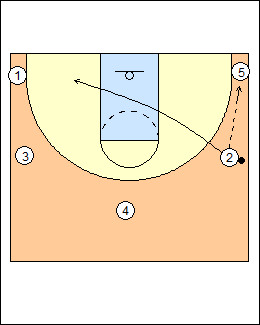 | 5 b) 2 cuts and clears on a pass to the corner, 4 holds out top, creating another double gap, this time for 5. |
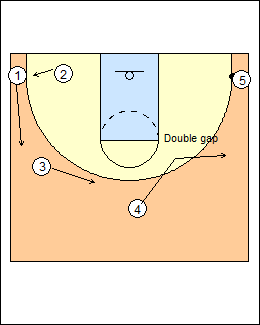 | 6 4 blast cuts to the wing after a two-count. |
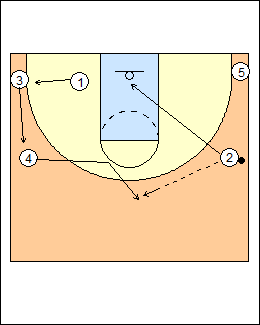 | 2) Exit Cut Reads a) 2 passes to 4 on the blast cut, cuts to the basket, pauses to read 4 (and can post up). 5 holds in the corner, maintaining a double gap for 4. If 4 attacks on the catch, 2 would break off the basket cut. |
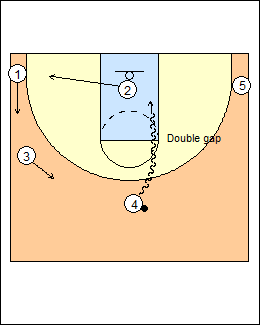 | 8 |
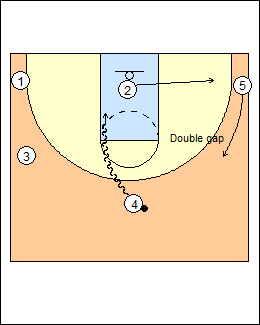 | 9 Here 4 drives left. 2 exits. Here 3 holds the wing, but can rotate behind the drive if X3 helps across or down, or backcut if X3 helps up (or slide to the corner if 1 backcuts on the drive). See Shooting - 3-line drive and kick. |
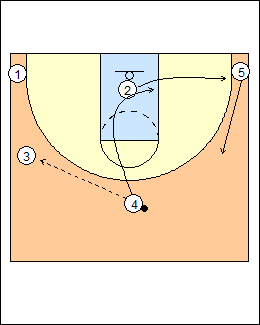 | 10 On a pass to 3, 4 basket cuts, 5 fills the wing, 2 exit cuts, 3 has a double gap to attack middle. Option - attack the double gap or finish the swing. 5 will blast cut to fill the top after a two-count if there is no dribble or pass. |
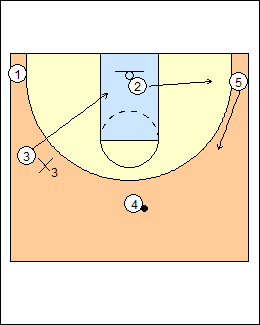 | 11 b) 3 backcuts to the rim if overplayed (or just to create space for 4), 2 exits, 5 lifts. 3 pauses to read 4. 1 holds in the corner, maintaining a double gap. 4 can attack before 3's cut, hit 3 on the backcut, or attack the basket behind 3's cut. MacKay - in a single gap, backcut immediately if you are looked at, dribbled at, or pivoted at. Sarama - if you are in a single gap, create a double gap for a teammate so they can blast cut. Doug Novak - Offensive Philosophy (pdf) - nothing can stop the ball from moving. If you can't swing the ball, dribble at the next offensive player for a backdoor or throw behind. If you can't throw behind, look to snapback where you dribbled from. Single-Double Gaps - don't follow too quickly behind a dribble-at, there should be a double gap if the ball is picked up. Score with 45 Cuts - dribble-ats almost always trigger a backcut. 45 cut from the wing for a pass and layup, or create space for the corner to blast cut. Spinella - 3 backcuts on a catch by 4, leading to a DHO with the corner. Matt Hackenberg - a double backcut can break pressure, 3 then 1 backcut. See Offence - 5-out dribble-attack continuity. |
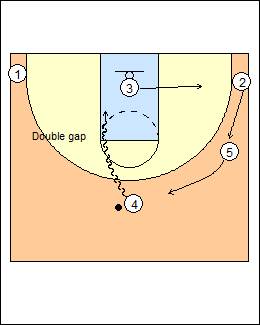 | 12 3 exits opposite if 4 drives from the top. |
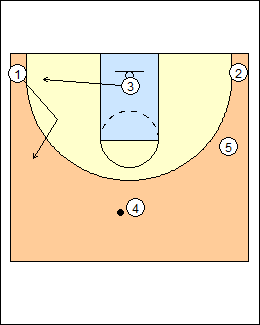 | 13 Otherwise 1 fills the wing after a two-count and 3 exits to the corner. See 2(b) above. MacKay - back cut and blast cut to fill behind (it's hard for X1 to help on the backcut and contest the blast cut). |
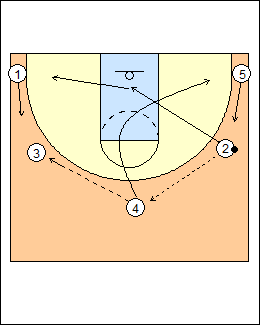 | 3) Progressions a) 2 passes to 4 and basket cuts, reads 4, and keeps going to the opposite corner on a pass to 3. This avoids having 2 and 4 cut to the same corner, and can create a bigger gap for 3, with 2 (and X2) behind the ball instead of in front. 3 could balance the floor by dribbling to the point (Hal Wissel). See Tactics - Dribble-drive quick-swing (Swing-quick). |
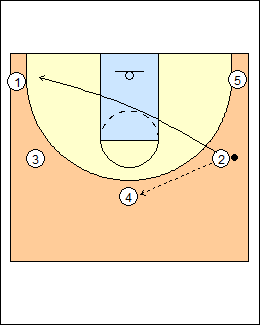 | 15 b) 2 passes to 4 and cuts directly to the opposite corner (a corner cut). See Offence - 5-out dribble-drive motion, also Mark Cascio - Drive and Space Offence. |
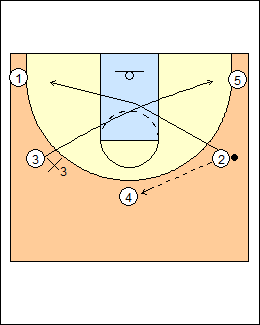 | 16 c) Also corner cut on a backcut. See Offence - 5-out dribble-attack continuity, Tactics - Creating Gaps. Chris Krauss - Motion Concepts - he doesn't like cuts all the way through, cut to the middle, read what's going on, you might have to come back, or relocate. Gregg Popovich - if denied anywhere on the court, go backdoor and continue in the direction you were going.  |
This page was made with Basketball playbook from Jes-Soft